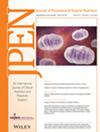Knowledge assessment tool for pediatric parenteral nutrition: A validation study
Abstract
Background
Parenteral nutrition (PN) is a high-risk medication, and its prescription and administration requires extensive training. Difficulties inherent with bedside teaching have made teaching these concepts challenging. Currently, no knowledge assessment tools with validity evidence exist to test the effectiveness of new PN teaching interventions. We sought to develop and provide validity evidence for a pediatric PN knowledge test to measure the effectiveness of future teaching interventions.
Methods
We created a multiple-choice question knowledge assessment tool that underwent content validation by PN experts and was emailed to potential participants. We evaluated the knowledge assessment tool for factorial validity, internal consistency reliability, and discriminant validity.
Results
We enrolled 103 medical students (40%), residents and fellow trainees (55%), and attending physicians (5%) into the study between October 2021 and October 2022. Five of the 30 questions performed poorly based on their nonsignificant contribution to the primary aim of assessing pediatric PN knowledge. Following the exclusion of those questions, the knowledge assessment tool demonstrated an acceptable model fit, and the root mean squared error of approximation was <5%. The omega coefficient was 0.829, indicating acceptable levels of reliability, and using an analysis of variance test (ANOVA) demonstrated significant differences between groups, showing good discrimination between levels of experience (F[2, 80] = 39.002; P < 0.001).
Conclusion
We have developed and provided validity evidence for a multiple-choice question knowledge test that may be used by educators and programs to evaluate knowledge of pediatric PN in physicians and trainees.

 求助内容:
求助内容: 应助结果提醒方式:
应助结果提醒方式:


